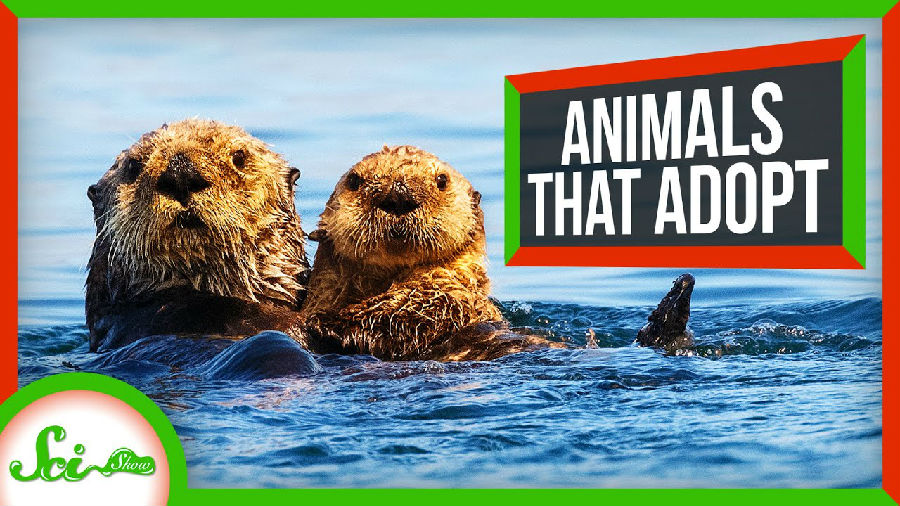Thanks to the Monterey Bay Aquarium for partnering with us on this episode of SciShow! It otter be a fun one.
感谢蒙特雷湾水族馆与我们合作本期节目!
Animals snuggling up with baby animals that are not related to them is internet gold.
与自己没有血缘关系的动物幼崽依偎在一起的动物在网络很受欢迎。
But memes aside, cute critters taking care of young that aren't their own, or alloparenting,
但是撇开网络迷因不谈,可爱的小动物们照顾着那些不属于自己的幼崽们(或称为替代父母行为),
is a real thing that has been documented in more than two hundred seventy species. Take Rosa, for example. That isn't her pup she's snuggling.
这是一件真实存在的事情,在超过270个物种中都有记录。比如,罗莎。她抱着的并不是自己的孩子。
You see, she's one of the residents at the Monterey Bay Aquarium who helps foster orphaned otters.
罗莎是帮助抚育孤儿水獭的蒙特雷湾水族馆居民之一。
And as a surrogate otter mom, she not only ensures that orphaned pups get lots of love,
作为代理水獭妈妈,她不仅保证孤儿水獭获得了很多的爱,
she also teaches them how to be an otter, so they can eventually be released back into the wild.
还教它们如何成为一只水獭,这样幼崽们最后就能重返野外。
Like, Selka here is teaching a youngster how to break open crab shells to get at the tasty meat inside. Ooo—Looks like they're a quick study!
比如,塞尔卡正在教小水獭如何破开蟹壳来获取里面美味的肉。它们似乎学的还挺快的!
Which is great, because catching and cracking open crabs is an essential otter skill.
这很棒,因为抓捕和破开蟹壳是水獭必备技能。
And this mama is teaching a little one how to dive and find food buried in the sand!
这位妈妈正在教一只小崽子如何潜入水中寻找埋藏在沙中的食物!
The fact that these otters are so willing to lend a paw and step in as parents might seem surprising, though.
然而,这些水獭如此乐意伸出援手,充当父母的角色,这一事实可能令人感到惊讶。
Surprising from an evolutionary perspective, that is.
从进化的角度来看,这是令人惊讶的。
After all, adoptive parents are essentially helping someone else's offspring that carry someone else's genes.
毕竟养父母本质上是在帮助携带别人基因的后代。
And usually, that care is at the adoptive parents' own expense. They have to use up some of their valuable energy and resources.
通常,这种照顾是由养父母自己承担的。它们需要用尽自己的一些宝贵精力和资源。
Like, a mama sea otter eats more than a third of her body weight every day in order to have the energy to take care of her pup.
比如海獭妈妈每天要吃掉体重三分之一的食物,才有精力照顾她的宝宝。
And if she doesn't have enough resources to take care of herself and her offspring, she'll usually abandon her young within the first few weeks after birth.
并且如果她没有照顾自己和后代所需的充足资源,她通常会在产下幼崽几周后抛弃自己的孩子。
Taking care of a young animal could have other costs, too, like delaying an animal's ability to have young of their own.
照顾一只动物幼崽还有其他成本,比如延迟动物拥有自己幼崽的能力。
So… why would they do it? Well, it turns out, there are a lot of possibilities.
所以它们为什么这么做?结果证明有很多种可能性。
For starters, for Rosa and Selka and the other animals at the Aquarium, resources aren't an issue.
首先,对于罗莎和塞尔卡以及水族馆的其他动物来说,资源不是问题。

The Aquarium's humans make sure everyone has plenty of food. And the otter moms don't need to worry about sharks or orcas or male sea otters, either.
水族馆的工作人员会确保每只动物都有充足的食物。水獭妈妈也不需要担心鲨鱼、逆戟鲸或雄性海獭。
Making sure the animals in their care are healthy and well fed is a big part of how rehabilitation programs
确保他们照顾的动物的健康和充足食物是恢复项目如何
encourage potential foster parents to follow their natural inclinations to take care of young animals.
鼓励潜在的养父母按照它们的自然倾向来照顾小动物的一个重要部分。
And sometimes, that 'natural inclination' may be much stronger, more like a biological urge to parent.
有时,这种‘自然倾向’可能会强烈得多,更像是一种生身父母的冲动。
The Aquarium team has observed wild otters adopting lost or orphaned pups. And, there have been cases of female polar bears adopting new litters.
水族馆研究小组观察到野生水獭收养走失或成为孤儿的幼崽。此外,还有一些雌性北极熊收养新幼仔的情况。
In both cases, biologists think that could be because they were physiologically "primed" for motherhood.
在两种情况中,生物学家认为这可能是因为它们在生理上已经为成为母亲做好了准备。
These cases all involve female animals that had recently lost their own young. And if that happened while the females were lactating,
这些案例都涉及最近失去幼崽的雌性动物。如果这种情况发生在雌性哺乳的时候,
they may have still had all these hormones swishing around in their bodies telling them to take care of babies.
它们体内可能仍然有这些荷尔蒙在不停地跳动,告诉它们要照顾好孩子。
Plus, since polar bears raise their cubs in dens away from other bears, they might not have evolved good kid-recognizing mechanisms.
此外,由于北极熊将它们的幼崽养在远离其他熊的洞穴里,它们可能没有进化出良好的幼崽识别机制。
In fact, that's probably another big reason alloparenting happens —the animals simply don't realize they aren't taking care of their own kids.
事实上,替代父母行为发生的另一个重要原因可能是,动物们根本没有意识到它们照顾的不是自己的孩子。
This might explain why birds like cowbirds and cuckoos can lay their eggs in other birds' nests
这或许可以解释为什么像燕八哥和布谷鸟这样的鸟会把自己的蛋产在其他鸟类的巢穴中
and successfully pass along their parenting duties to entirely different species!
并成功地将养育责任传递给完全不同的物种!
The parent birds don't want to mistakenly reject one of their own, so they're better off just taking care of everyone in their nest.
父母不想错误地拒绝自己的孩子,所以它们最好照顾好自己巢里的每一只鸟。
And in some species, breeding sites are so crowded that it can be hard to tell whose kids are whose,
在一些物种中,繁殖地非常拥挤,很难分辨出谁的孩子是谁的,
so parents just take care of whichever ones are nearby. There might be some other benefits to doing that, too.
所以父母只要照顾附近的孩子就可以了。这样做可能还有其他一些好处。
It could be that the young are at least sort of related to them —they're their sister's or their cousin's offspring.
可能是这个幼崽至少和它们存在某种关联—是它们姐妹或表亲的后代。
In that case, they share some of the same genes. Plus, there's the possibility of a little "you watch my kid, I'll watch yours."
在这种情况下,它们有着一些相同的基因。此外,也有可能是‘你照顾我的孩子,我就会照顾你的孩子’。
That seems to be what happens in many species of whales and dolphins.
很多种类的海豚和鲸鱼似乎存在这种情况。
Young ones can't always keep up with their fast-swimming, deep-diving parents.
幼崽们不能总是跟上它们游得快、潜得深的父母。
And frankly, like most parents, sometimes, cetacean mamas just want a break to do something not kid-related.
坦白讲,和很多父母一样,鲸类妈妈有时只想做一些和孩子无关的事情。
So, it's common for other adults in a social group to take over parenting duties from time to time.
所以该社交群体中的其他成年鲸鱼偶尔会承担父母的责任。
Sometimes, these alloparents even let the babies drink their milk!
有时,这些养父母甚至让幼崽们喝自己的奶!
And that might be because they're related to the actual parents, as social groups tend to contain relatives.
这可能是因为它们与真正的父母之间有亲属关系,因为社交群体中也有亲戚。
But even if they're not, they might reasonably expect that someone else will take care of their kids
但即使没有,它们也有理由期望当它们需要帮助的时候,
when they need someone to lend a hand —or, in the event of their untimely demise.
有人会照顾它们的孩子——或者,在它们过早死亡的情况下。











